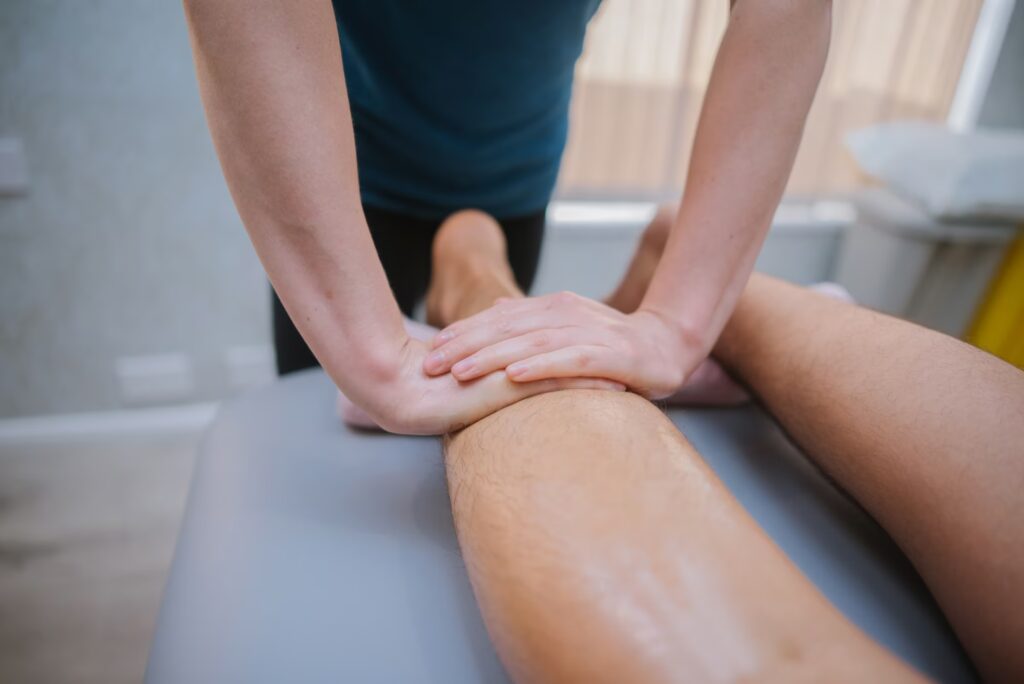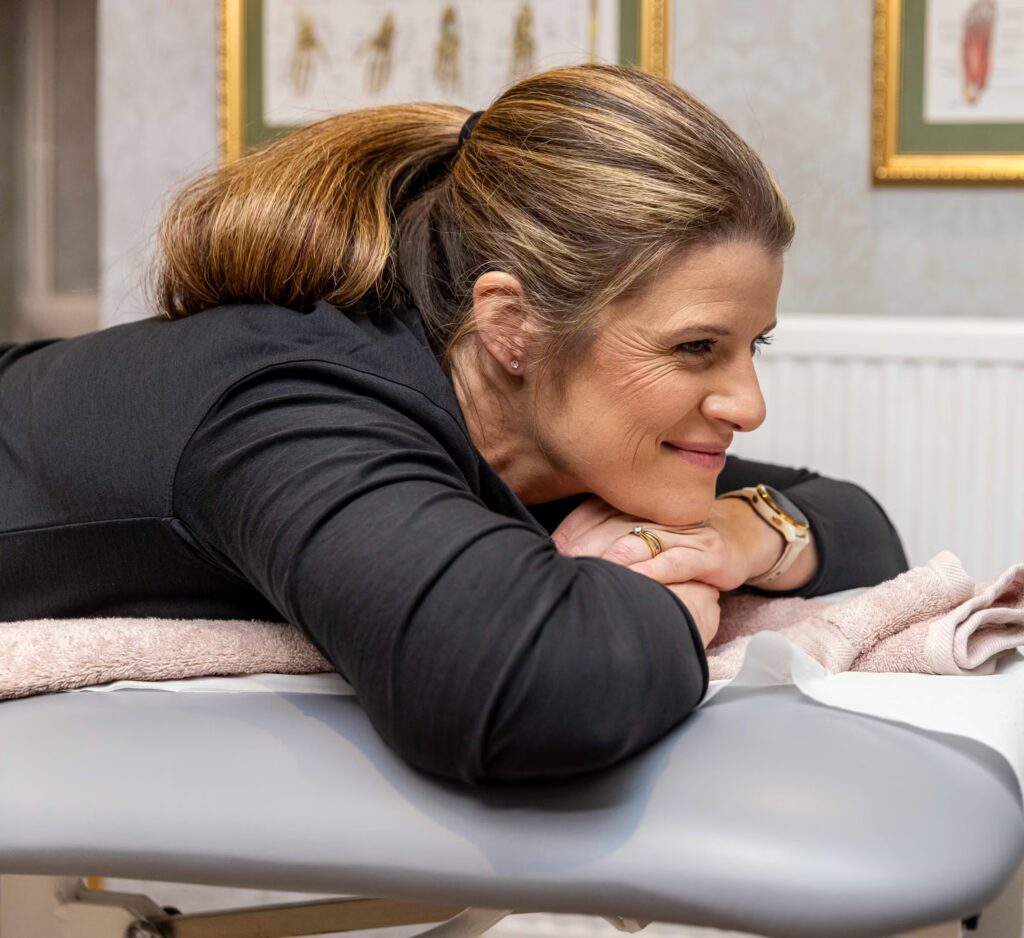Service
Sports Massage
Sports massage is one of those treatments that almost everyone can benefit from – whether you’re an athlete or just someone who sits at a desk all day. At Back to Fitness Physio, our physios understand how the body moves, how it compensates, and what areas tend to tighten up over time. These sessions are not just about relieving muscle soreness, but improving mobility, easing tension, and helping you feel better in your own skin. It’s hands-on, specific, and focused on results — and can be booked as a standalone session or as part of a wider rehab plan.


Who Can Benefit From Sports Massage?
You don’t have to be a marathon runner or lift heavy weights to benefit from sports massage. If you have tight shoulders, aching legs, a stiff lower back, or just generally feel “knotted up,” a well-targeted massage can make a world of difference. We see office workers with postural tension, active teenagers with tight calves or quads, gym-goers working on recovery, and busy parents carrying the weight of life — literally and figuratively.
Sports massage can help manage everything from general aches and pains to more specific issues like delayed onset muscle soreness (DOMS), ITB tightness, glute tension, or neck and upper back stiffness. It’s also an ideal add-on for anyone going through physiotherapy, as it complements rehab and recovery perfectly.
What Does Sports Massage Involve?
A sports massage session usually starts with a short chat about your symptoms, activity levels, and any areas of tension or restriction. It’s important to know that sports massage is remedial — it’s great for helping with general tightness, muscle fatigue, and postural strain. But if you’re dealing with an actual injury, ongoing pain, or something that doesn’t feel quite right, we’ll always recommend a physiotherapy assessment first to rule out anything more serious and ensure it’s safe to treat.
The treatment itself is hands-on and tailored to your needs. We use a combination of deep tissue techniques, myofascial release, trigger point therapy, and stretching to ease tension and improve tissue health. Depending on your goals, we might work on a specific area (like tight calves or shoulders) or take a more general approach across several muscle groups.
You’re always in control — we’ll adapt the pressure to your comfort level and check in with you throughout the session. Most people leave feeling looser, more mobile, and like they’ve just had a proper “reset.”
Benefits and Outcomes of Sports Massage Treatment
The goal of sports massage isn’t just relaxation (though that’s often a welcome side effect). It’s about improving the way your body moves and feels — especially if tight muscles, knots, or poor posture are starting to affect your comfort or performance.
Regular sports massage can help with:
- Reduced muscle soreness and stiffness
- Improved flexibility and range of motion
- Faster recovery after sport or training
- Better posture and spinal alignment
- Reduced risk of injury
- Relief from tension headaches, upper back pain, and neck tightness
Whether you’re dealing with aches from everyday life or pushing yourself in the gym, sports massage can help your body feel more balanced, mobile, and ready to move.
Faq's
Sports Massage FAQs
What is a sports massage?
A sports massage is a specialist form of massage therapy designed to address the unique needs of athletes and individuals engaged in regular physical activity. It involves a combination of techniques tailored to enhance athletic performance, promote recovery, and prevent injuries.
Can I exercise after a sports massage?
Yes, you can do light exercise like walking or stretching after a sports massage to help your muscles recover. However, avoid intense or high-impact workouts right away, and always pay attention to how your body feels.
Can you have a sports massage when pregnant?
Yes, you can have a sports massage during pregnancy if it’s done safely by a qualified therapist. It can help relieve muscle tension, improve circulation, and reduce stress, but certain areas and positions must be avoided. Always check with your healthcare provider before booking a massage.
Does a sports massage hurt?
A sports massage may cause some discomfort, especially when working on tight muscles, but it shouldn’t be painful. It’s normal to feel sore afterward, similar to after a tough workout. Always tell your therapist if the pressure is too much, so they can adjust it for your comfort.
Does sports massage improve performance?
Yes, sports massage can boost performance by improving flexibility, joint mobility, and circulation. It helps reduce muscle tension and pain, speeds up recovery, and supports mental relaxation for better focus and sleep.
How does sports massage complement other therapies and treatments?
Sports massage works well with other treatments by loosening muscles and improving circulation, which helps physiotherapy, acupuncture, and strength training be more effective. It speeds up recovery, reduces pain and stress, and supports better nutrient delivery and overall wellness when combined with good nutrition.
How does sports massage reduce pain and stress?
Sports massage reduces pain by relaxing tight muscles, improving circulation to speed healing, breaking down scar tissue, and triggering natural painkillers called endorphins. It also lowers inflammation and eases tension at specific pain points. For stress relief, massage promotes deep relaxation, lowers stress hormones, improves sleep, and boosts mood-enhancing brain chemicals to help you feel calmer and more balanced.
How long is a sports massage?
At our clinic, we offer sports massages in two durations:
- 30 minutes
- 60 minutes
How much is a sports massage?
We offer two durations for sports massages:
- 30 minutes for £40
- 60 minutes for £75
How to prepare for a sports massage?
To prepare for a sports massage, stay well hydrated before and after your session to help your muscles respond and recover. Eat a light meal at least an hour beforehand and wear comfortable, easy-to-remove clothing. Communicate any injuries or pressure preferences with your therapist, arrive early to relax, avoid intense exercise before your massage, and consider a warm shower to loosen your muscles.
How often should I get a sports massage?
How often you should get a sports massage depends on your activity and goals. Athletes training hard may benefit from weekly or biweekly sessions, while recreational exercisers might choose one every two to four weeks. For injury recovery, weekly massages can help, and for general maintenance or stress relief, monthly sessions are usually enough.